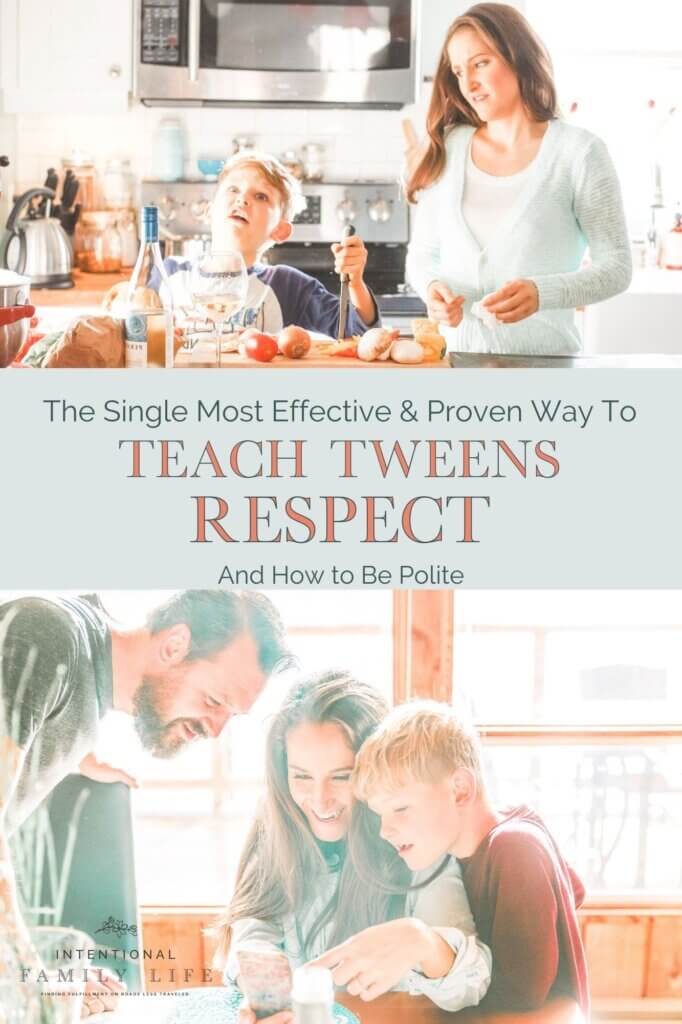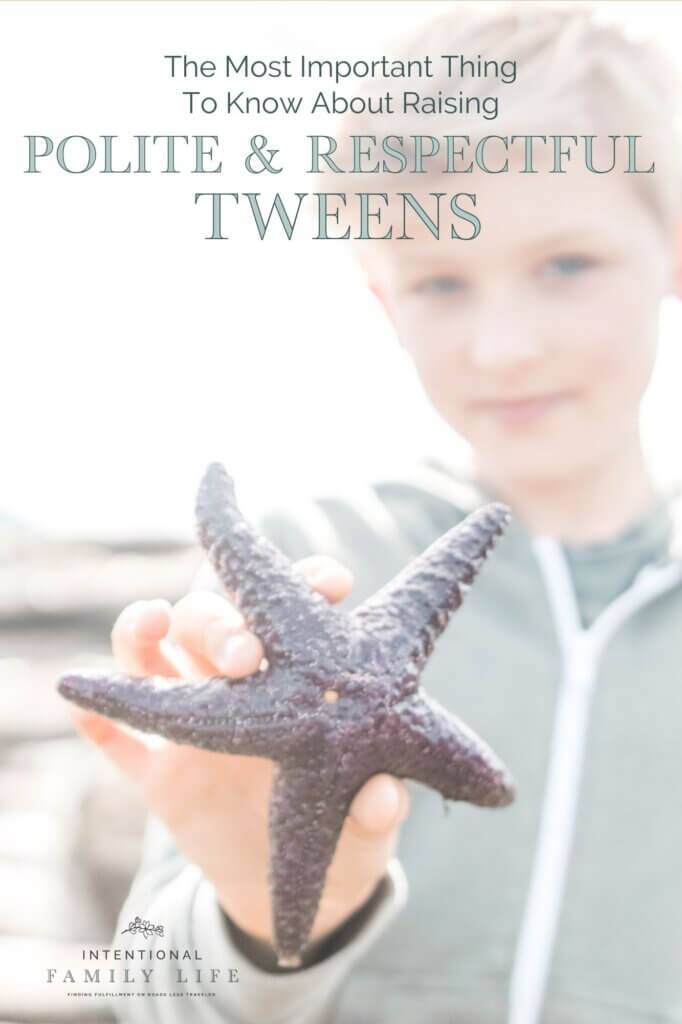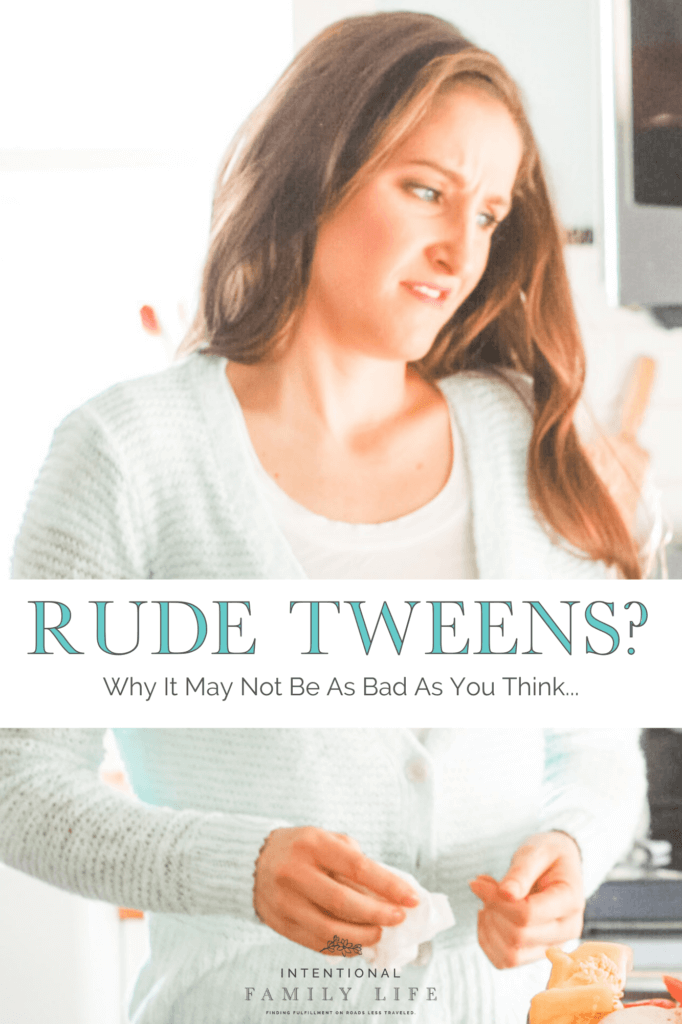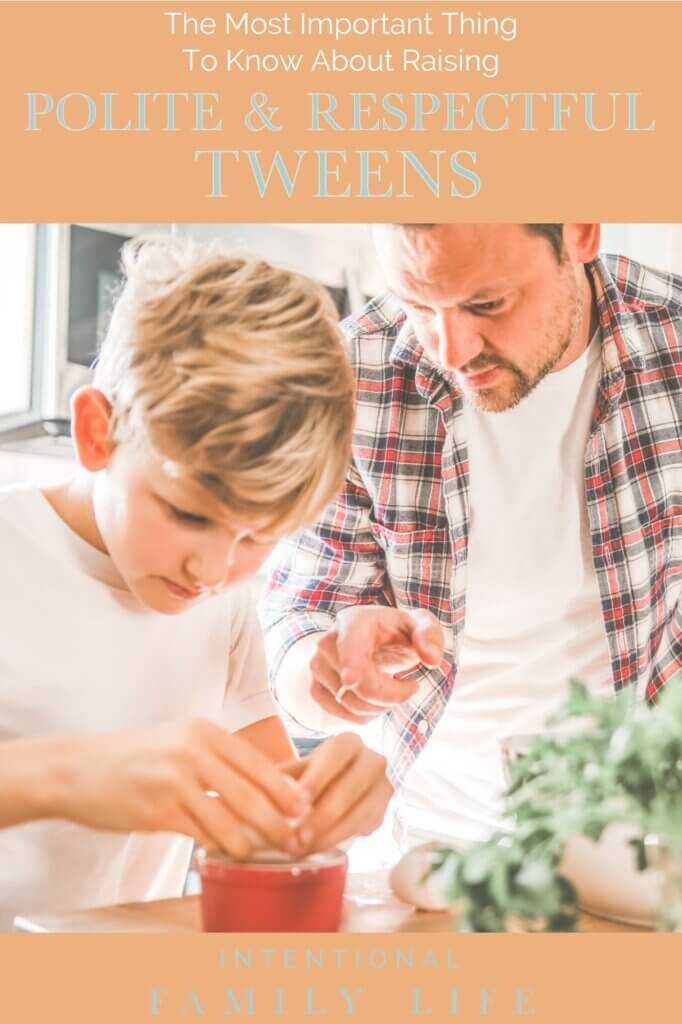Spoiler Alert: Tweens are entering a new and more independent phase of their lives. Manners and respect are not always top of mind for them – unless we emphasize respect as a tightly held principle of family behavior and expectations. Learning how to teach your child politeness, manners, and respect is not so much a one-off “lesson” that is taught and absorbed. Instead, it’s more of a way of living and behaving in your family. It’s the constant modeling of the behavior that you wish to see. A reinforcement of the values that are important to you. Let me show you how!

Ya’ll.
I’ve had several posts rattling around in my brain for a bit chock full of things I want to share with you. And they’ve all been big lightbulb moments for me – hence the reason I’m eager to share. But all I can think to start writing with is, “YA’LL.” So, just “Ya’ll.”
What is Respect?
Abstract thinking isn’t one of my strongest skills – I’m not always great with abstract concepts. And the idea of respect can feel abstract as you’re considering how to show and teach tweens and teens about respect.
When my boys were little, we talked about the golden rule. And this was a great start. In short, respect is a way of showing caring.
But when they get older, and you’re teaching a teen or tween, it’s time to dig a bit deeper. This is the best definition I’ve found:
At the heart of respect is caring. In simple words, respect is caring how words and actions may impact others.
Respect has two parts: 1) having respect for someone because of how their actions impact others and 2) showing respect by changing your actions to be sure you don’t have a negative impact.
Respect means you care enough to think about how you impact others.

Is Your Child Being Disrespectful?
How many times do you jump to the conclusion that your child’s behavior is rude without knowing the entire story? Especially during the tween and teen years?
It can be all too easy to jump to the conclusion that the kids are rude.
Several years ago, we had a birthday party at our house for my oldest son. One of his guests was leaving early and I asked my son if he wanted to come downstairs and say goodbye to his guest.
He said, “no.”
Wait. Whaaaaaaat?
I asked him to come speak with me privately.
Did the “good mother” thing. I explained how it was polite and respectful to walk guests to the door, thank them for coming, and say good-bye.
He said, “Mom, it’s ok. I don’t need to say goodbye to him.”
Ok. I’ll bite, “Why don’t you feel that you need to say goodbye to your guest?”
“I said goodbye upstairs – and he’s coming right back. He just forgot something at home.”
Me. *sheepishly* “Oh.”
Now that we know more of the story: Was this disrespectful or rude behavior?
Let’s look at what rudeness is and also a few examples of respect.

An Illusion of Rudeness / A Myth of Respect
I recently saw this YouTube video about being kind and respectful and it validated so many experiences that I’ve had in my life (like the one above).
It also perfectly describes why I choose to teach kids politeness and respect in the way and that I do and with a respectful (see what I did there?) parenting style.
Check out the video: (or come back to it, because I’m about to get into the nitty gritty of it!)
What Is Rudeness?
A child (or anyone else for that matter) has to do two things to be rude.
First, they have to fail to meet one of our expectations.
Second, there can be no reasonable excuse for the failure to meet expectations.
Recognize that each of these scenarios is subjective and they leave lots of room for you to imprint your family’s unique values upon them.
But…this is a bit of a double edged sword. It definitely helps us define what is rude behavior for our family. We can set the expectations for our family members and we can also hold standards as to what would constitute a “reasonable excuse” for not meeting them. (Remember An Affair to Remember? I think we can all agree Terry had more than a reasonable excuse for not showing…)
But – and here’s the tricky part – we can’t define these subjective ideas for others or their families.
When we try to do so, we are refusing to acknowledge and celebrate differences – condemning the customs or traditions of different cultures or simply their lack of knowledge of our customs – simply because we jumped to the conclusion that they behaved rudely.
Consider this: In China, burping is seen as a sign of satisfaction with the meal and is considered a compliment to the chef, so don’t be surprised if it happens at the dinner table! If we were to consider this person rude at our dinner table, we would deny them the opportunity to engage in their own cultural customs as well as deny ourselves the opportunity to learn about their culture! (And, we would never know that our guest had given her compliments to the chef!)
Surely, this isn’t what we want for our kids! I wan my kids to not only “tolerate” but to celebrate diversity.
Concrete Examples of Respect
Here are the Cliff’s Notes: respect is about caring. Respect is an action or feeling that shows we care.
EXAMPLES OF RESPECT
- Admiring (respecting) a historical figure who stood up for what she believed in, even when it was hard.
- You are quiet in a library to show that you care about (respect) others’ need to read without interruption.
- You follow your parents’ rules to show them you care (respect) how they feel about the situation.
- Not calling people names because you care about (respect) their feelings.
- Not damaging public places because you care about (respect) preserving the quality of the place and other people’s right to enjoy it.
- You don’t hit or otherwise hurt people because you care about (respect) their well-being.
- Using other people’s toys with care (respect) so you don’t break them.
- You dress, speak, and act in a way that shows you care about what you know is right and safe, because you care about (respect) yourself and your well-being.
- Not interfering with other people’s right to look, think, or act differently than you because you care about (respect) their feelings and well-being.
I cannot take credit for this list which takes an abstract concept and turns it concrete. (Refer back to my abstract thinking challenges.)
A definition of respect for children
It can be really eye-opening to discover what and whom our kids respect. If you want to learn a bit more about challenges and struggles your tweens & teens are facing, and if you want to know what acts your child respects or seeks to emulate, sign up below!
Want A Fun Way To Learn More About Behaviors That Your Child Respects?
Three Cures To Seeing Rudeness
I know it can be all too easy to jump to the conclusion that the kids are being rude. But what if we could show our tweens and teens (and everyone else) some grace, gave them the benefit of the doubt, and had a bit more confidence in our own ability to be good role models and to show our kids a positive attitude. Take a deep breath, mama and realize that there may be more to the story.
This first idea is HARD for me!
Lean into the discomfort of not knowing why somebody behaved in the way that they did. Recognize that you don’t need to know why they behaved the way they did in response to your kindness.
Let’s model for our children and teach them that take pride in their acts of kindness and respect. Instead of becoming angry at another person’s response to our actions – let’s simple rest in the comfort of knowing that we acted in a kind and respectful way.
There’s a paradox here. Let’s move toward abandonment of the ideas of rudeness and respect. Instead, if we can behave kindly simply because it’s the right thing to do, we have raised good humans. We have made the world just a bit more of a compassionate place for all of us.
I always teach my kids to take stock of the things that they can control vs. the things they cannot control. As I’m teaching respect, I make sure they understand that they can control whether their behavior is polite and respectful. But, they cannot control how people will respond.
But remember, we aren’t teaching our kids that the response is the reason for polite and respectful behavior.
Their expression of kindness – whether it’s reciprocated or not – is the reason.
Showing and Teaching Respect To Our Tweens & Teens
So what does this all mean for our goal of peaceful parenting?
It means that when we show our kids respect, they learn respect. They learn respect in all its forms.
They learn the most important reason that we show respect – to share kindness with others regardless of the response.
And possibly even more important than them learning respect is that by showing our children respect, we hold space for them to be their own person – not forever chained to the subjective views of others. And we allow them to hold that space for others as well.
PIN THIS SO THAT YOU CAN COME BACK LATER!



